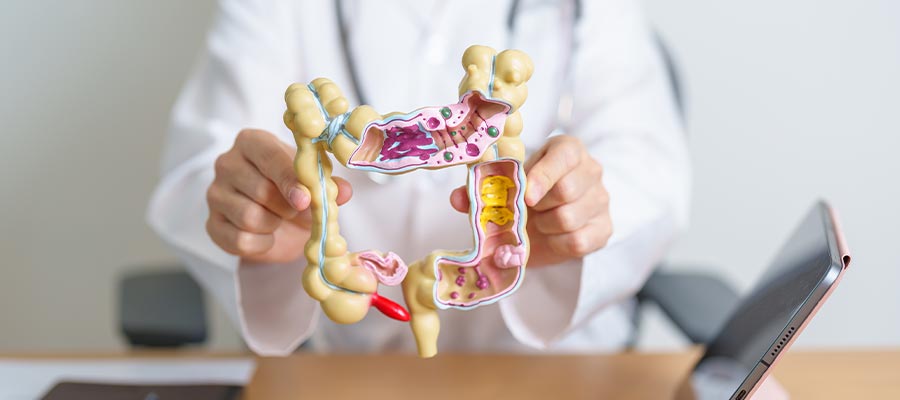Inflammatory Bowel Disease (IBD) Treatment Specialist in New Hyde Park, NY
Inflammatory bowel disease (IBD) refers to chronic inflammation of the digestive tract, which includes conditions like Crohn’s disease and ulcerative colitis. It can cause symptoms such as abdominal pain, diarrhea, and fatigue, and may lead to serious complications if untreated. At Digestive Disease Care, our board-certified gastroenterologists provide expert diagnosis and treatment for managing IBD and improving your quality of life. Contact us today or book an appointment online. We are conveniently located at 1575 Hillside Ave, New Hyde Park, NY 11040.


Table of Contents:
What is inflammatory bowel disease (IBD)?
What are the symptoms of inflammatory bowel disease?
What causes inflammatory bowel disease?
What are the complications of inflammatory bowel disease?
Inflammatory bowel disease (IBD) is a term used to describe chronic inflammation of the digestive tract, primarily affecting the colon and small intestine. The two main types of IBD are Crohn’s disease and ulcerative colitis. Crohn’s disease can affect any part of the gastrointestinal tract, causing inflammation in patches, while ulcerative colitis typically impacts the colon and rectum, leading to continuous inflammation. Both conditions are characterized by symptoms like abdominal pain, diarrhea, fatigue, and weight loss.
The exact cause of IBD remains unclear, but it is believed to result from a combination of genetic predisposition, an abnormal immune system response, and environmental factors. Though IBD is not contagious, it can increase the risk of colon cancer over time, particularly in individuals with long-standing inflammation. Treatment options include medications to control inflammation and manage symptoms, and in severe cases, surgery may be required to remove the affected portions of the intestine. Proper management can help minimize flare-ups and improve quality of life for those living with IBD.
The symptoms of inflammatory bowel disease (IBD), which includes both Crohn’s disease and ulcerative colitis, can vary from mild to severe and may come and go in flare-ups. The symptoms primarily affect the gastrointestinal system but can also involve other parts of the body. These symptoms are often related to inflammation in the digestive tract, which can lead to pain, discomfort, and disruptions in normal bowel function.
Common Symptoms of Inflammatory Bowel Disease:
1. Abdominal Pain and Cramping
One of the most common symptoms of IBD is abdominal pain, often in the lower abdomen. Cramping can occur, especially after eating or during bowel movements.
2. Chronic Diarrhea
Frequent, loose, or watery stools are common in IBD. Diarrhea may be accompanied by an urgent need to go to the bathroom and can sometimes include blood or mucus.
3. Fatigue
Individuals with IBD often experience extreme tiredness, which may be due to inflammation, nutrient malabsorption, or the body’s immune response to the disease.
4. Weight Loss
Unintentional weight loss may occur due to poor nutrient absorption and the body’s increased calorie needs during active inflammation.
5. Bloody Stool
Especially in ulcerative colitis, blood in the stool can be a sign of active disease or flare-ups, and it may appear as bright red or dark, tarry stools.
6. Loss of Appetite
A reduced desire to eat is common in IBD, often due to abdominal pain, bloating, and other discomforts.
7. Rectal Bleeding
Bleeding from the rectum can occur, often associated with ulcers or inflammation in the colon.
8. Nausea and Vomiting
Nausea, sometimes leading to vomiting, can occur, especially during flare-ups or when the disease affects the small intestine.
9. Joint Pain and Skin Issues
IBD can cause joint pain, rashes, and other symptoms outside of the gastrointestinal system due to the body’s immune response.
If you experience any of these symptoms, especially over a prolonged period, it’s important to see a healthcare provider for proper diagnosis and management of IBD.
The exact cause of inflammatory bowel disease (IBD), which includes Crohn’s disease and ulcerative colitis, remains unclear. However, it is believed that IBD results from a combination of genetic, immune, and environmental factors. These factors contribute to an abnormal immune response that causes chronic inflammation in the gastrointestinal tract. While IBD is not directly caused by infections or lifestyle alone, several key factors can increase the risk of developing the condition.
Causes of Inflammatory Bowel Disease:
1. Genetic Factors
A family history of IBD increases the risk of developing the condition. Certain genes are thought to make individuals more susceptible to IBD. Studies show that people with a first-degree relative with IBD are more likely to develop the disease themselves.
2. Immune System Dysfunction
IBD is thought to result from an abnormal immune response. In healthy individuals, the immune system protects against infections. In IBD, however, the immune system mistakenly attacks the lining of the digestive tract, causing chronic inflammation and tissue damage.
3. Environmental Triggers
External factors, such as diet, stress, and infections, may act as triggers for IBD in genetically predisposed individuals. For instance, a diet high in processed foods or certain bacteria and viruses may increase the risk.
4. Smoking
Smoking is a known risk factor for Crohn’s disease and can worsen its severity. While smoking is harmful in both types of IBD, it has a different effect on ulcerative colitis, where it may offer some protective effect, although this is not fully understood.
5. Age and Ethnicity
IBD commonly develops in individuals between the ages of 15 and 30, though it can occur at any age. Additionally, people of Jewish descent have a higher risk of developing IBD.
6. Gut Microbiota
Imbalances in the bacteria that normally live in the intestines (gut microbiota) may contribute to the development of IBD by influencing the immune system and gut health.
While the exact cause is not fully understood, these factors work together to trigger inflammation and symptoms in individuals susceptible to IBD.
Inflammatory bowel disease (IBD), including Crohn’s disease and ulcerative colitis, can lead to various complications, both within the digestive system and beyond. While treatment can help manage symptoms, untreated or severe IBD can cause significant health issues.
Complications of Inflammatory Bowel Disease:
1. Intestinal Obstruction
Chronic inflammation can cause scar tissue to form in the intestines, leading to narrowing or blockage. This can result in pain, vomiting, and difficulty passing stool.
2. Perforation of the Bowel
In severe cases, the inflammation can cause a hole (perforation) in the intestine, leading to peritonitis, a life-threatening infection of the abdominal cavity.
3. Colon Cancer
Long-term inflammation in the colon, particularly in ulcerative colitis, increases the risk of developing colon cancer. Regular screening is recommended for those with long-standing IBD.
4. Abscesses and Fistulas
In Crohn’s disease, deep tissue inflammation can lead to abscesses (pockets of pus) and fistulas (abnormal passages connecting different parts of the intestine or other organs).
5. Malnutrition
IBD can impair nutrient absorption, leading to deficiencies in vitamins, minerals, and other essential nutrients. This can result in weight loss, fatigue, and overall poor health.
6. Extra-intestinal Complications
IBD can also affect other parts of the body, causing joint pain, skin rashes, and eye inflammation. In some cases, liver disease or kidney problems may develop.
Early diagnosis and proper management are crucial in preventing or minimizing these complications. Contact us today or book an appointment online. We are conveniently located at 1575 Hillside Ave, New Hyde Park, NY 11040. We have convenient locations to serve you in Melville NY, New Hyde Park NY, Forest Hills NY, Jericho NY, Mineola NY, Lake Success NY, Babylon NY, East Setauket NY, Massapequa NY, Riverhead NY and BEYOND.

Check Out Our 5 Star Reviews


Additional Services You May Like

Additional Services You May Like
- Abdominal Pain
- Acid Reflux
- Barretts Esophagus
- Bloating
- Capsule Endoscopy
- Celiac Disease
- Colon Cancer Screening
- Colonoscopy
- Constipation
- Crohns Disease
- Diarrhea
- Diverticulitis
- Esophageal PH Monitoring
- Fatty Liver
- Fibroscan
- Gallstones
- Gastroenterologist
- Gastric Chest Pain
- Gluten Intolerance
- Hemorrhoid
- Hemorrhoid Banding
- Hepatitis
- Irritable Bowel Syndrome
- Lactose Intolerance
- Pancreatitis
- Polyps
- Rectal Bleeding
- Stomach
- Ulcerative Colitis
- GI Urgent Care





